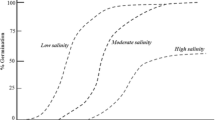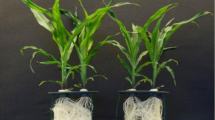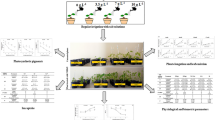Abstract
Fifteen genotypes of sweet potato were evaluated for salinity stress tolerance under in vitro NaCl mediated salinity stress conditions (MS, MS + 0.5% and MS + 1.0% NaCl). The growth parameters such as number of leaves, number of shoots, number of roots, length of plantlets and length of roots decreased significantly among the genotypes with increase in level of salinity. Of the 15 genotypes tested, six genotypes (108X1, 90/606, 90/696, CIP 8, S-30X15 and SP-61) were unable to sprout even at 0.5% NaCl and were characterized as susceptible to salt stress, three genotypes (CIP 6, 90/774 and CIP 3) which could tolerate 0.5% NaCl as moderately tolerant and six genotypes (CIP 12, CIP 13, JO 14, JP 13, SB-198/115 and Gouri) as tolerant to salinity at 1.0% NaCl. Amongst the six genotypes showing tolerance to 1.0% NaCl, the exotic genotypes––JP 13, CIP 12 and indigenous one SB-198/115 continued to exhibit significant higher values for growth parameters over the susceptible one. Based on the performance under NaCl mediated salinity stress (1.0%), the pattern of salinity tolerance in the genotypes through shoot apex culture was JP 13 > SB-198/115 > JO 14 > Gouri > CIP 12 > CIP 13. The effect of salt stress on the activity of antioxidative enzymes was studied in leaves of 8-week-old plantlets of those six genotypes, which responded at higher NaCl stress along with a susceptible genotype 90/606. In leaves of salt stressed plants, superoxide dismutase (SOD), guaiacol peroxidase (GPX) and catalase (CAT) activities increased when compared with the stress free control. The increase was more pronounced in the tolerant genotypes than that in the susceptible one. These results indicate that oxidative stress may play an important role in salt stressed sweet potato plants and that the greater protection of tolerant plants from salt induced oxidative damage results, at least in part, through the increase in the activity of antioxidant enzymes.


Similar content being viewed by others
Abbreviations
- BA:
-
Benzyl adenine
- CAT:
-
Catalase
- EDTA:
-
Ethylene diamine tetra acetic acid
- GA3 :
-
Gibberellic acid
- GPX:
-
Guaiacol peroxidase
- MS:
-
Murashige and Skoog
- NAA:
-
α-Naphthalene acetic acid
- NBT:
-
Nitroblue tetrazolium chloride
- ROS:
-
Reactive oxygen species
- SOD:
-
Superoxide dismutase
References
Aebi HE (1983) Catalase. In: Bergmeyer HU, Bergmeyer J, Bl Gra M (eds) Methods of enzymatic analysis, 3rd edn, vol 3. VCH, Weinheim, pp 273–286
Bradford MM (1976) A rapid and sensitive method for the quantification of microgram quantities of proteins utilizing the principle of protein-dye binding. Anal Biochem 72:248–254. doi:10.1016/0003-2697(76)90527-3
Cano AE, Perez-Alfocea F, Moreno V, Caro M, Bolarin MC (1998) Evaluation of salt tolerance in cultivated and wild tomato species through in vitro shoot apex culture. Plant Cell Tissue Organ Cult 53:19–26. doi:10.1023/A:1006017001146
Chandler SF, Paek KY, Pua EC, Ragolsky E, Mandal BB, Thorpe TA (1988) The effectiveness of selection for salinity tolerance using in vitro shoot culture. Bot Gaz 149:166–172. doi:10.1086/337704
Dasgupta M, Mukherjee A, Sahoo MR, Naskar SK, Kole PC (2006) Physiological response of orange fleshed sweet potato (Ipomoea batatas L.) under salt stress conditions. J Root Crops 32:53–58
Dasgupta M, Sahoo MR, Kole PC, Mukherjee A (2007) Relationship of yield contributing characters in sweet potato (Ipomoea batatas L.) under salinity stress. Orissa J Hortic 35:27–31
Dionisio-Sese ML, Tobita S (1998) Antioxidant responses of rice seedlings to salinity stress. Plant Sci 135:1–9. doi:10.1016/S0168-9452(98)00025-9
Ekanayake IJ, Dodds JH (1993) In vitro testing for the effects of salt stress on growth and survival of sweet potato. Sci Hortic (Amsterdam) 55:239–248. doi:10.1016/0304-4238(93)90035-O
Giannopolitis CN, Ries SK (1977) Superoxide dismutases. I. Occurrence in higher plants. Plant Physiol 59:309–314
Gomez KA, Gomez AA (1984) Statistical procedures for agricultural research. Wiley, New York
Gosal SS, Bajaj YPS (1984) Isolation of sodium chloride resistant cell lines in some grain legumes. Indian J Exp Biol 22:209–214
Halliwell B, Gutteridge JMC (1984) Oxygen toxicity, oxygen radicals, transition metals and disease. Biochem J 219:1–14
Hernandez J, Jimeenez A, Mullineaux P, Sevilla F (2000) Tolerance of pea plants (Pisum sativum) to long term salt stress is associated with induction of antioxidant defences. Plant Cell Environ 23:853–862. doi:10.1046/j.1365-3040.2000.00602.x
Martinez CA, Maestri M, Lani EG (1996) In vitro salt tolerance and proline accumulation in andean potato (Solanum spp.) differing in frost resistance. Plant Sci 116:177–184. doi:10.1016/0168-9452(96)04374-9
Mercado JA, Sancho-Carrascosa MA, Jimenez-Bermudez S, Peran-Quesada R, Pliego-Alfaro F, Quesada MA (2000) Assessment of in vitro growth of apical stem sections and adventitious organogenesis to evaluate salinity tolerance in cultivated tomato. Plant Cell Tissue Organ Cult 62:101–106. doi:10.1023/A:1026503603399
Mills D, Tal M (2004) The effect of ventilation on in vitro response of seedlings of the cultivated tomato and its wild salt-tolerant relative Lycopersicon pennellii to salt stress. Plant Cell Tissue Organ Cult 78:209–216. doi:10.1023/B:TICU.0000025642.20704.51
Mittler R (2002) Oxidative stress, antioxidants and stress tolerance. Trends Plant Sci 7:405–410. doi:10.1016/S1360-1385(02)02312-9
Mittova V, Tal M, Volokita M, Guy M (2003) Up-regulation of the leaf mitochondrial and peroxisomal antioxidative systems in response to salt induced oxidative stress in the wild salt-tolerant tomato species Lycopersicon pennellii. Plant Cell Environ 26:845–856. doi:10.1046/j.1365-3040.2003.01016.x
Mukherjee A (2001) Effect of NaCl on axillary shoot proliferation in sweet potato. Ann Trop Res 23:1–10
Murashige T, Skoog F (1962) A revised medium for rapid growth and bioassay with tobacco tissue culture. Physiol Plant 15:473–497. doi:10.1111/j.1399-3054.1962.tb08052.x
Nabors MW, Dykes TA (1985) Biotechnology in international agricultural research. International Rice Research Institute, Manila, pp 121–138
Roussos PA, Tsantilli E, Pontikis CA (2006) Response of jojoba explants to different salinity levels during the proliferation stage in vitro. Ind Crops Prod 23:65–72. doi:10.1016/j.indcrop. 2005.04.006
Rout NP, Shaw BP (2001) Salt tolerance in aquatic macrophytes: possible involvement of the antioxidative enzymes. Plant Sci 160:415–423. doi:10.1016/S0168-9452(00)00406-4
Sairam RK, Srivastava GC (2002) Changes in antioxidant activity in sub cellular fractions of tolerant and susceptible wheat genotypes in response to long term salt stress. Plant Sci 162:897–904. doi:10.1016/S0168-9452(02)00037-7
Tewary PK, Sharma A, Raghunath MK, Sarkar A (2000) In vitro response of promising mulberry (Morus sp.) genotypes for tolerance to salt and osmotic stresses. Growth Regul 30:17–21. doi:10.1023/A:1006297830318
Urbanek H, Kuzniak-Gebarowska E, Herka K (1991) Elicitation of defense responses in bean leaves by Botrytis cinerea polygalacturonase. Acta Physiol Plant 13:43–50
Vijayan K, Chakraborti SP, Ghosh DP (2003) In vitro screening of mulberry (Morus spp.) for salinity tolerance. Plant Cell Rep 22:350–357. doi:10.1007/s00299-003-0695-5
Villa-Castorena M, Ulery AL, Valencia EAC, Remmenga MD (2003) Division S-4––soil fertility and plant nutrition. Soil Sci Soc Am J 67:1781–1789
Watanabe S, Kojima K, Ide Y, Sasaki S (2000) Effects of saline and osmotic stress on proline and sugar accumulation in Populus euphratica in vitro. Plant Cell Tissue Organ Cult 63:199–206. doi:10.1023/A:1010619503680
Acknowledgements
The first author gratefully acknowledges the financial support of ICAR Ad hoc Scheme to carry out the present investigation. The authors are also thankful to the Director, Central Tuber Crops Research Institute, Trivandrum and Head, Regional Centre of Central Tuber Crops Research Institute, Bhubaneswar for infrastructure facilities.
Author information
Authors and Affiliations
Corresponding author
Rights and permissions
About this article
Cite this article
Dasgupta, M., Sahoo, M.R., Kole, P.C. et al. Evaluation of orange-fleshed sweet potato (Ipomoea batatas L.) genotypes for salt tolerance through shoot apex culture under in vitro NaCl mediated salinity stress conditions. Plant Cell Tiss Organ Cult 94, 161–170 (2008). https://doi.org/10.1007/s11240-008-9400-2
Received:
Accepted:
Published:
Issue Date:
DOI: https://doi.org/10.1007/s11240-008-9400-2




